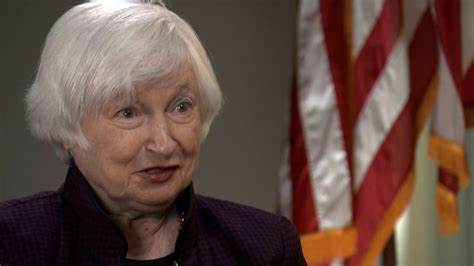Janet Yellen’s recent comments on inflation, contrasting with President Joe Biden’s stance, have brought into focus a nuanced debate on the factors driving price increases in the United States. In a CNBC interview, Yellen articulated her view that inflation primarily results from supply and demand dynamics rather than corporate misconduct, a viewpoint that diverges from Biden’s earlier attribution of inflation to corporate greed.
Yellen pointed out that the surge in inflation witnessed during and after the pandemic largely stemmed from supply chain disruptions and stresses. These disruptions, such as delays in production and shipping bottlenecks, caused imbalances where demand exceeded available supply, leading to price hikes across various sectors. This explanation aligns with traditional economic theory, which posits that inflation arises from such mismatches between supply and demand.
The discussion with CNBC’s host also touched on Biden’s characterization of inflation as driven by corporate greed. Yellen acknowledged concerns about concentrated market power in certain industries, which can result in higher markups and consumer prices. However, she emphasized that the Biden administration’s approach to addressing these issues includes robust antitrust policies aimed at fostering competition. By promoting a more competitive marketplace, the administration aims to mitigate the potential for excessive price increases driven by lack of competition.
The divergence between Yellen and Biden’s perspectives underscores broader philosophical differences in how to interpret and address economic challenges. Biden’s emphasis on corporate accountability and greed reflects a populist narrative that resonates with concerns about income inequality and perceived abuses by powerful corporations. This perspective has informed policy discussions on regulatory reforms aimed at curbing monopolistic practices and ensuring fair pricing.
In contrast, Yellen’s emphasis on supply chain disruptions and market dynamics reflects a more conventional economic viewpoint rooted in the principles of supply-side economics. Her stance suggests a belief that addressing inflation requires measures that stabilize supply chains, boost production capacities, and enhance overall economic resilience against future disruptions.
The implications of these differing perspectives extend beyond theoretical debate to practical policy implications. Biden’s focus on corporate accountability may influence legislative agendas and regulatory enforcement efforts aimed at promoting transparency and fairness in business practices. Meanwhile, Yellen’s approach may guide economic policies aimed at rebuilding supply chains, reducing vulnerabilities, and restoring equilibrium in markets.
As the administration navigates the complexities of managing inflation and fostering economic recovery, reconciling these divergent views will be crucial. Finding a balanced approach that addresses both the structural causes of inflation and concerns about corporate behavior will be essential for shaping effective economic policies that support sustainable growth and mitigate the impact on consumers.
In summary, Yellen’s remarks highlighting supply and demand dynamics as the primary drivers of inflation, in contrast to Biden’s focus on corporate greed, underscore ongoing debates within the administration on economic policy priorities. These discussions will continue to shape the trajectory of regulatory reforms and economic strategies aimed at navigating current challenges and promoting long-term economic stability.
